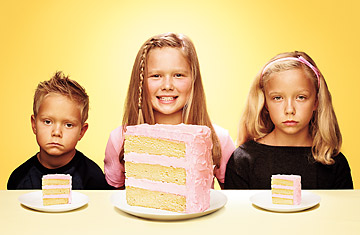
There's sweetness in the lies parents tell their kids, which is a very good thing, since they tell a lot of them. Yes, that indecipherable crayon scribble looks exactly like Grandma. No, I didn't put that tooth-fairy money under your pillow. The fibs — nearly all of them harmless — may differ depending on the family. But from clan to clan, culture to culture, there's one tall tale nearly all parents tell, and they tell it repeatedly: "We do not have a favorite child."
Mom and Dad will say it earnestly, they'll repeat it endlessly, and in an overwhelming share of cases, they'll be lying through their teeth. It's one of the worst-kept secrets of family life that all parents have a preferred son or daughter, and the rules for acknowledging it are the same everywhere: The favored kids recognize their status and keep quiet about it — the better to preserve the good thing they've got going and to keep their siblings off their back. The unfavored kids howl about it like wounded cats. And on pain of death, the parents deny it all.
The stonewalling is understandable. Most parents want to spare unfavored kids the hurt that true candor could cause. Moreover, the court of public opinion can respond pitilessly — even furiously — to moms or dads who speak the forbidden truth. Last March, a mother of two wrote a candid post on the website Babble.com under the headline I THINK I LOVE MY SON JUST A LITTLE BIT MORE. The mom went on at length describing the greater warmth she feels for her baby boy compared with her toddler girl and even included a photo of herself and her unfavored daughter.
She was, predictably, blowtorched. "Please work on your issues lady!" said one typical response. "I feel absolutely horrible for your daughter!" read another. But then there was this: "I completely understand. I too feel this way."
The hard truth is, most parents do. In one oft cited study, Catherine Conger, a professor of human and community development at the University of California at Davis, assembled a group of 384 sibling pairs and their parents and visited them three times over three years. She questioned them about their relationships and videotaped them as they worked through conflicts. Overall, she concluded that 65% of mothers and 70% of fathers exhibited a preference for one child, usually the older one. And those numbers are almost certainly lowballs, since parents try especially hard to mask their preferences when a researcher is watching.
If the scientists don't see through the ploy, however, kids usually do — and react accordingly. From the moment they're born, brothers and sisters constantly jostle for the precious resource of parental attention, each fighting to establish an identity that will best catch Mom's or Dad's eye. I'm the smart one! I'm the funny one!
Just who will win that love-me-best sweepstakes is hard to predict. The father-son bond is the stuff of legend — unless it's the father-daughter one that's the rule in your family. A mother innately understands her daughters — unless the girls turn out to be a mystery to her and she adores one of her boys best. It's equally hard to predict the fallout from favoritism. Being the favorite may boost self-esteem and confidence. But studies show it can also leave kids with a sense of arrogance and entitlement. Unfavored children may grow up wondering if they're somehow unworthy of the love the parents lavished on the golden child. But they may do better at forging relationships outside the family as a result of that. And there's no telling how the differential treatment will play out among the kids.
"My mom didn't like my older sister and did like me," says Roseann Henry, an editor and the married mother of two girls. "Everyone assumed I had it great, except that my sister tortured me pretty much all the time — and really, what affects daily life more for a kid, the approval of a parent or the day-to-day torment of an older sister?"
Nature's Rules
If the parental habit of assigning different values to different children can cause such pain, it's hard to understand why it ever became such a firmly established part of human nature. As with so much else in child-rearing behavior, it begins with the parents' survival needs: the biologically narcissistic act of replicating themselves through succeeding generations. This impels Mom and Dad to tilt in favor of their biggest, healthiest offspring, since those kids will be more reproductively successful and get more of the family's genes into the next generation.
